Treatment with the help of the patient’s own information
in the BICOM® mobile VET bioresonance device
In contrast to other “frequency therapy devices”, BICOM® bioresonance is a method that is highly individual and perfectly tailored to the needs of the patient through the use of the patient’s own information and the possibility of testing specific wave patterns for resonance.
The patient’s own pathological and physiological information is recorded using special applicators and fed into the BICOM® mobile VET.
Depending on the therapy program, the specific wave pattern as a carrier of information is amplified, weakened or inverted and transmitted back to the patient in modulated form, which means that the transmission of information changes in clarity depending on the modulation or it disappears completely.
The treatment signals continuously adapt to the changing pathological situation of the patient. As the therapy progresses, the body’s ability to regulate is reactivated.
Find out more about this topic at our regular events. Together with veterinarians and animal naturopaths, we offer various face-to-face and online events .
The BICOM® bioresonance method is a cause-oriented, holistic treatment concept. It can narrow down the cause of the health problem in animals and find out even the hidden causes of the clinical picture.
Animals have a natural regulatory system that can also compensate for unusual influences. However, even good self-healing powers eventually reach their limits. Persistent exposure to allergens, environmental toxins, fungi, viruses, bacteria or stress and changed living conditions weaken the immune system and are often the cause of an illness. In particular, fungal infestation on the skin or chronic diseases in general are not always due to a breeding-related genetic defect, but are signs of a disturbed immune system.
The BICOM® bioresonance method is the key to successful diagnosis and therapy, especially for animals that cannot tell us exactly where it hurts or what the symptoms are. It is a gentle form of therapy that can be carried out without side effects and without additional stress for the animal.
The BICOM® mobile VET records the bioenergetic state of the animal, processes the information it contains and returns modified vibrations / therapy frequency patterns to the animal. Symptoms and stress can be diagnosed and targeted therapy can be initiated.
Through the use of endogenous and exogenous substances, the body’s own self-healing powers can be activated and imbalances that have existed for a long time can also be regulated.
REGUMED Medizintechnik are pioneers of the BICOM® bioresonance method. More than 30,000 therapists worldwide, well over 10,000 of them in Germany, successfully use their therapy concept.
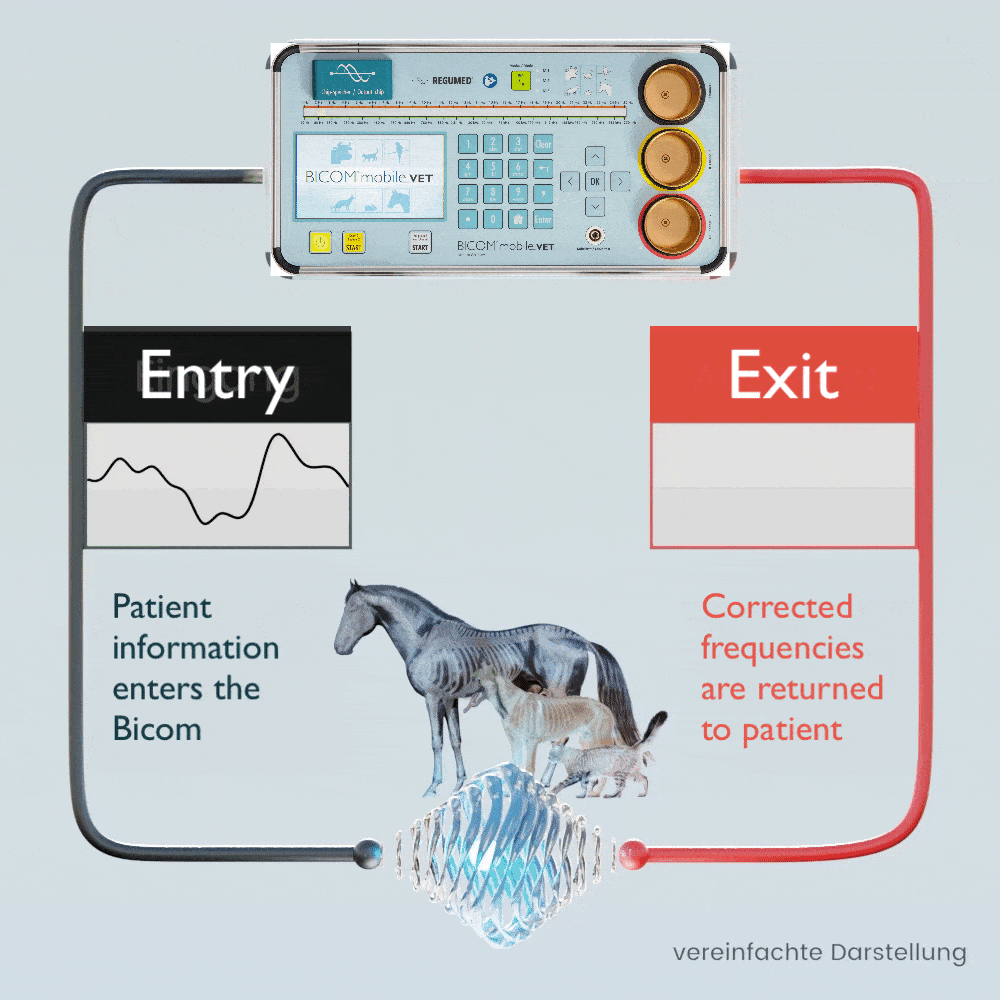
Biophysical basics of the bioresonance method
Life is only possible when three conditions are met: matter, energy and information.
We also find these aspects in conventional medicine, both in diagnostics and in therapy. For example, every drug is also a carrier of information.
Information is neither energy nor matter, it is immaterial and comparable to the meaning of a message from a sending to a receiving system.
In addition to the electrical processes in the receptor proteins and biomembranes in general, electromagnetic interactions through light (biophotons) also play a role in cell communication and the transmission of information.
Specific electromagnetic wave patterns act as information carriers. These wave patterns can be modulated by the BICOM® device in order to eliminate disturbing or stressful information in an organism.
The goal is to restore the free flow of healing information (cell communication) and thus support the self-regulation of the organism and the self-healing powers.
Individual, patient-specific information or information from native substances, digitized substances or information stored on storage media can be used for therapy.
What your colleagues are saying…

Top Tips to Prepare Your Pet for a Visit to White Cross Vets
How to Prepare Your Pet for a Visit to White Cross Vets
When taking your pet to the vet, especially for the first time, it can be a stressful experience for both you and your furry friend. Preparing your pet in advance for their visit to White Cross Vets can make the process smoother and more comfortable for everyone involved. This guide will provide detailed, easy-to-follow steps to ensure that your pet is calm, well-behaved, and ready for their appointment at White Cross Vets.
1. Get Your Pet Comfortable with Their Carrier
If you’re taking a cat or small dog to White Cross Vets, using a pet carrier is essential. Many animals are unfamiliar or uncomfortable with being in a carrier. Start by introducing the carrier well before the appointment. Place it in a common area of your home, leaving the door open, and add familiar bedding or toys. This allows your pet to explore and become comfortable with the carrier in a stress-free environment. You can even place treats inside to create a positive association.
2. Practice Short Car Rides
Many pets, especially cats and dogs, are not used to car rides, and they may associate travel with negative experiences like visiting the vet. Before heading to White Cross Vets, take your pet on a few short car rides. These can be around the block or to a nearby park. The goal is to desensitize your pet to car travel and reduce any anxiety they may feel on the day of their appointment. Be sure to use a proper restraint, like a pet seat belt or crate, to keep your pet safe during the trip.
3. Schedule an Appointment Time That Suits Your Pet
At White Cross Vets, appointments are flexible, but choosing the right time is crucial. For pets that are typically more energetic and excitable, a morning appointment may be better when they’re still calm. On the other hand, if your pet is more relaxed in the afternoon or evening, choose a later time. Also, consider your pet’s feeding and bathroom habits when scheduling the visit, ensuring they are comfortable and not too hungry or tired during their vet appointment.
4. Prepare Your Pet with Basic Commands
Before visiting White Cross Vets, it’s helpful to practice basic obedience commands like sit, stay, and come. Even if you’re not working with a dog, cats and other small animals can benefit from some form of calm training. Teaching your pet to remain calm in various environments will help them during their vet visit. For example, reward your pet with treats and praise when they stay still or follow commands. This will make handling easier for the vet and reduce your pet's stress.
5. Bring Familiar Items to the Vet Visit
A visit to White Cross Vets can be an unfamiliar and sometimes frightening experience for pets. To help ease this anxiety, bring along familiar items from home. These can include your pet’s favorite blanket, toy, or even a piece of clothing that smells like you. The familiar scent and comfort of these items can help soothe your pet during the vet visit and make them feel more secure in the exam room.
6. Get Your Pet Accustomed to Being Handled
At White Cross Vets, the veterinary team will likely need to handle your pet for exams, vaccinations, or treatments. If your pet isn’t used to being handled, this can cause stress. In the weeks leading up to the visit, practice handling your pet at home. Gently touch their paws, ears, and mouth, rewarding them with treats when they stay calm. This will help your pet become more comfortable with the kind of handling they’ll experience at White Cross Vets, making the visit easier for everyone involved.
7. Stay Calm and Confident
Animals can sense your emotions. If you are nervous or anxious about the visit, your pet may pick up on these feelings and become stressed as well. Before heading to White Cross Vets, try to remain calm and confident. Speak to your pet in a soothing voice, and act as if the visit is no big deal. This will reassure your pet and help them remain calm during the trip to the vet.
8. Make Sure Your Pet is Comfortable Before the Visit
Ensure that your pet has used the bathroom and eaten before heading to White Cross Vets. A hungry or uncomfortable pet will be less cooperative during the appointment. However, avoid overfeeding, especially before a car ride, as this can lead to nausea or upset stomach. A light meal and a bathroom break an hour before the visit are usually ideal.
9. Bring Along Your Pet’s Medical Records
If you are visiting White Cross Vets for the first time, make sure to bring any relevant medical records, especially if your pet has had previous treatments or vaccinations. These records will help the vet get a complete picture of your pet’s health and ensure they receive the proper care. If White Cross Vets already has your pet’s records, it’s still a good idea to bring a list of any medications or supplements your pet is currently taking.
10. Plan for Extra Time
It’s important to arrive at White Cross Vets a little early to allow your pet time to adjust to the new environment. Rushing into the vet’s office may increase your pet’s anxiety. Arriving 10-15 minutes early gives your pet the chance to explore the waiting area, smell new scents, and get used to the surroundings before their appointment. This extra time can make the entire experience less stressful.
11. Reward Your Pet After the Visit
After a successful visit to White Cross Vets, make sure to reward your pet with something they enjoy, like a special treat, extra playtime, or a trip to the park. This will create a positive association with the vet visit, making future trips less stressful for your pet. For dogs, a trip to their favorite spot after the vet can be a great reward. For cats, some quiet time at home with their favorite toy or treat can help them recover from the experience.
12. Communicate with the Vet
The vets and staff at White Cross Vets are there to ensure your pet’s health and well-being. Don’t hesitate to communicate any concerns or special instructions with the veterinary team. Whether your pet has a fear of loud noises, prefers being handled a certain way, or has specific dietary needs, the more information you provide, the better the team can tailor their approach to your pet’s needs. Open communication with your vet will make the visit more comfortable for both you and your pet.
13. Plan Regular Vet Visits
Getting your pet used to regular vet visits can help reduce their stress over time. Routine visits to White Cross Vets will allow your pet to become more familiar with the environment and staff. Over time, these regular appointments will make the vet’s office a less intimidating place for your pet, leading to smoother check-ups in the future.
14. Choose the Right Vet in the UK
If you’re in the UK and looking for the best vet for your pet, White Cross Vets stands out as a top choice. Their experienced team and pet-friendly environment make them one of the leading names in pet care. Whether you have a dog, cat, or another small animal, White Cross Vets provides expert care tailored to your pet’s individual needs. Choosing the right vet in the UK can make all the difference in your pet’s health and well-being.
15. Be Prepared for Emergency Visits
While regular visits to White Cross Vets are important, it’s also good to be prepared for emergencies. Keep White Cross Vets' contact information readily available, and know the signs of a pet emergency. If your pet ever requires urgent care, having a plan in place will ensure that they get the medical attention they need as quickly as possible.
Conclusion
Preparing your pet for a visit to White Cross Vets is essential for reducing stress and ensuring a smooth experience. By following these simple steps—getting your pet comfortable with their carrier, practicing short car rides, scheduling an ideal appointment time, and more—you can help your pet feel more at ease during their vet visit. Regular vet appointments are key to maintaining your pet’s health, and by choosing the best vet in the UK, like White Cross Vets, you’re ensuring they receive top-quality care.
Treatment Priorities
For gentle and optimal treatment of the causes of diseases in animals
The BICOM® bioresonance method is predestined for use with large and farm animals such as horses , but also with dogs , cats and small animals. The treatment focus of the BICOM® mobile VET is wide-ranging. It is now used for many indications.
It recognises health deficits at an early stage and is used, among other things, for the following symptoms:
sweet itch
Feed intolerances
allergies and related diseases
COB/COPD
leishmaniasis
Lyme disease
anaplasmosis
lameness in horses
hoof ulcer
Poisoning by poisoned baits, plants etc.
mauke
Feline infectious peritonitis (FIP)
Cat flu/cat disease
eye/conjunctivitis
and much more
Get advice now!
Our experts are happy to be there for you personally
Our BICOM® bioresonance experts are available to answer any questions you may have
and will be happy to advise you personally and individually.
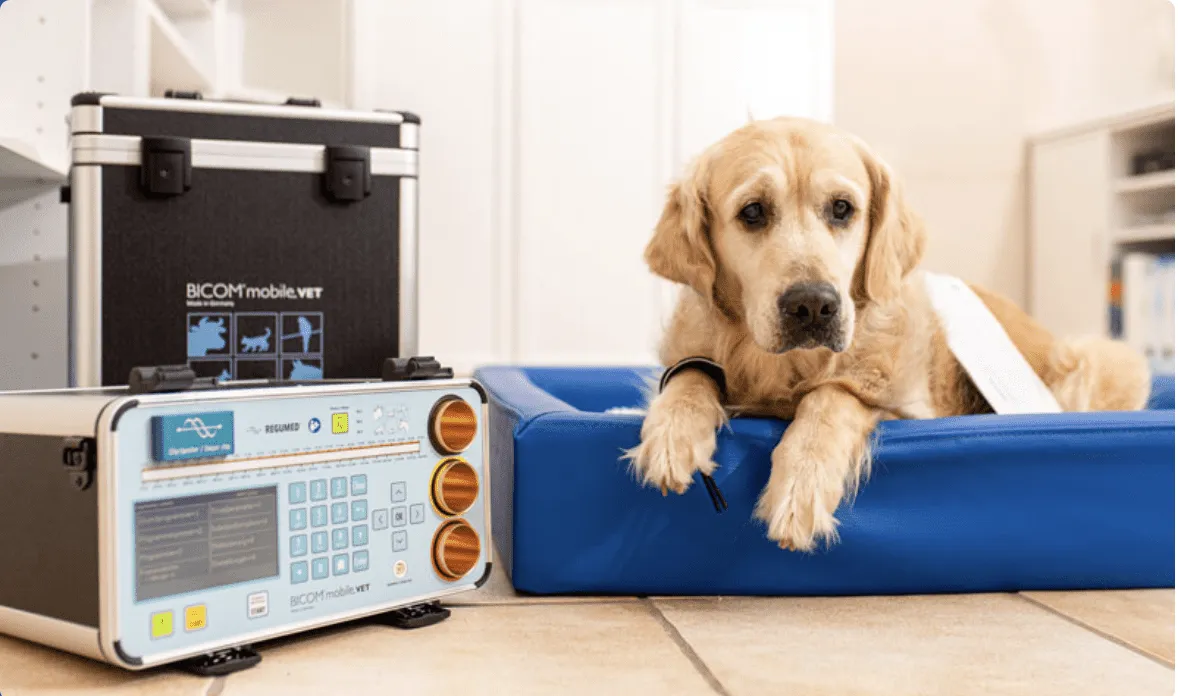
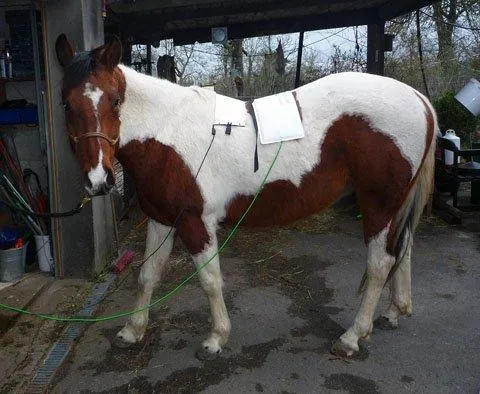

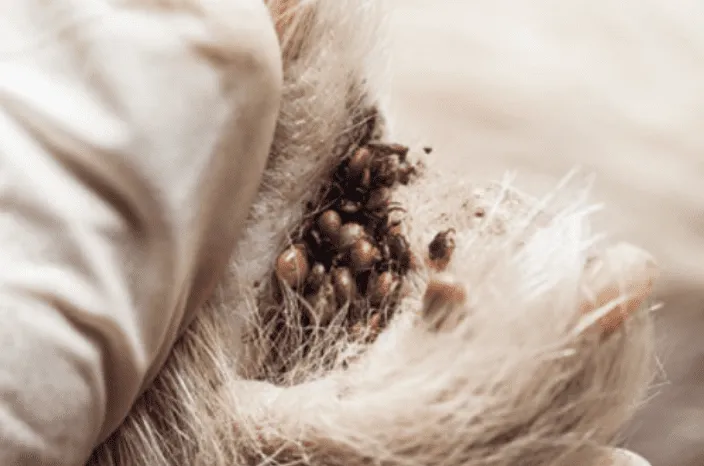
Request more information
Quick Links

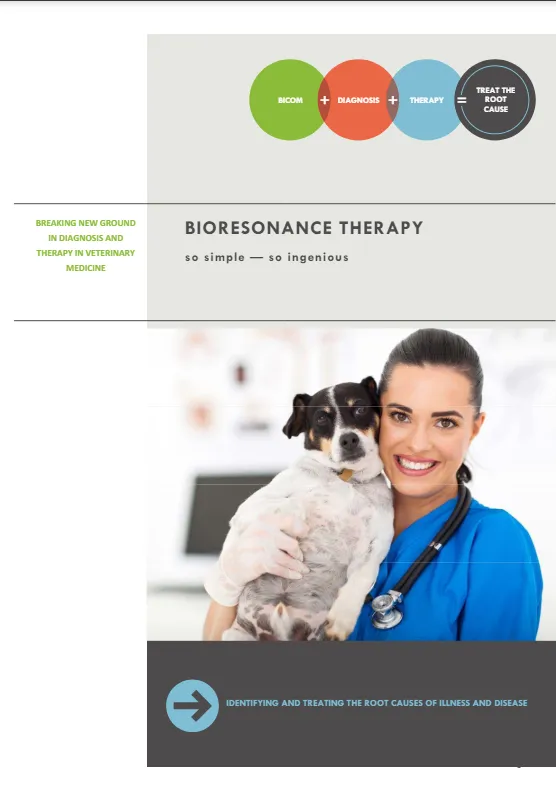
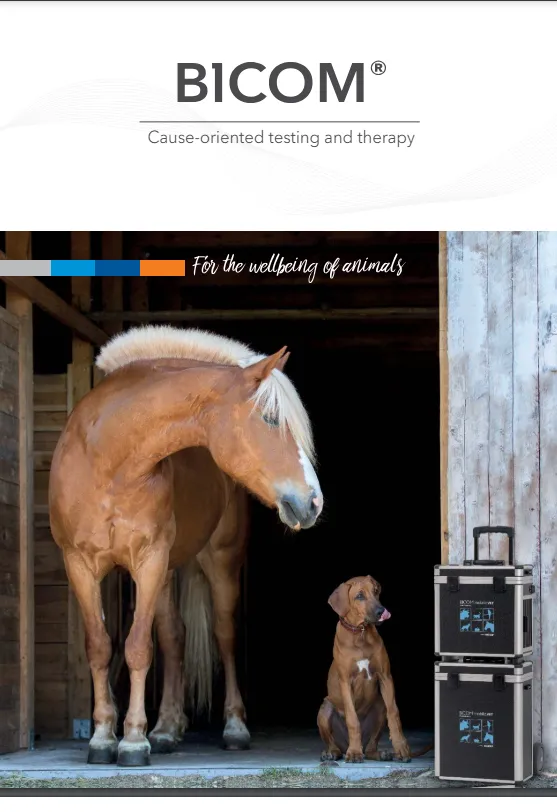


Facebook
Instagram
Mail